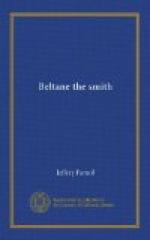“My lord,” quoth he, eyes a-dance, “yonder cometh a pompous prior that was, not very long since, nought but massy monk that did upon a time (though by dint of some small persuasion) bestow on me a goodly ass. My lord, I was bred a monk, so do I know, by divers signs and portents, he cometh here to ban the city with book, bell and candle, wherefore the townsfolk, fearing greatly, do shiver and shake, especially the women and maids—sweet souls! And, lord, by reason of the matter of the ass, I do know this priest prolific of damnatory pronouncements and curses contumacious (O verily). Yet I, messire (having been bred a monk) shall blithely him out-curse, an the joy be permitted me, thus turning tears to laughter and gloomy fear to loud-voiced merriment—my lord, messires, how say you?”
“’Tis blasphemy unheard!” quoth Sir Brian.
“Save in the greenwood where men do breathe God’s sweet air and live free!” said wry-necked Eric.
“And,” spake Sir Benedict, stroking his square chin, “there is a fear can be quelled but by ridicule, so may thy wit, sir archer, avail more than our wisdom—an thou canst make these pale-cheeked townsfolk laugh indeed. How think you, my Beltane?”
“That being the wise and valiant knight thou art, Sir Benedict, thy will during the siege is law in Belsaye, henceforth.”
Now hereupon Giles made his obeisance, and together with Roger and Walkyn and Ulf, hasted up to the battlement above the gateway.
“Benedict,” said Sir Brian as they climbed the turret stair, “blasphemy is a dread and awful thing. We shall be excommunicate one and all— better methinks to let the populace yield up the city and die the death, than perish everlastingly!”
“Brian,” quoth Sir Benedict pausing, something breathless by reason of his recent sickness, “I tell thee fire and pillage and ravishment of women is a thing more dread and awful—better, methinks, to keep Innocence pure and unspotted while we may, and leave hereafter in the hands of God and His holy angels!”
Upon the tower there met them the Reeve, anxious of brow, who pointed where the townsfolk talked together in fearful undertones or clustered, mute and trembling, while every eye was turned where, in the open, ’twixt town and camp, a procession of black-robed priests advanced, chanting very solemn and sweet.
“My lords,” said the Reeve, looking round with haggard eyes, “an these priests do come to pronounce the Church’s awful malediction upon the city—then woe betide! Already there be many—aye, some of our chiefest citizens do fear the curse of Holy Church more than the rapine of Ivo’s vile soldiery, fair women shamed, O Christ! Lords—ha, messires, there is talk afoot of seizing the gates, of opening to this churchman and praying his intercession to Ivo’s mercy—to Ivo the Black, that knoweth nought of mercy. Alas, my lords, once they do ope the gates—”
“That can they in nowise do!” said Sir Benedict gently, but with face grim and hawk-like. “Every gate is held by stout fellows of my own following, moreover I have good hope yon churchman may leave us yet uncursed.” And Sir Benedict smiled his wry and twisted smile. “Be you our tongue, good Reeve, and speak this churchman as thy bold heart dictateth.”




